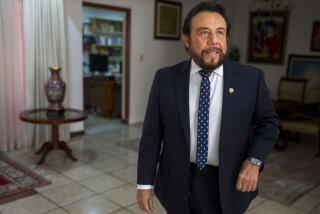Duarte Offers to Meet With Guerrillas
- Share via
SAN SALVADOR — President Jose Napoleon Duarte offered Thursday to meet with Salvadoran guerrillas to discuss a cease-fire, and he called on Nicaraguan President Daniel Ortega to sit down with the contras fighting the Managua government on the same day.
Duarte proposed holding the simultaneous talks on Sept. 15, the day Central America celebrates its independence from Spain. He did not make it clear whether the Nicaraguan talks are a condition for the Salvadoran meeting.
Guerrillas of El Salvador’s Farabundo Marti National Liberation Front said this week that they are willing to meet with Duarte inside or outside of the country, in public or privately, to discuss a cease-fire as well as an 18-point peace plan they submitted to the government last May.
Duarte announced his offer in a speech before the Legislative Assembly, the diplomatic corps and leaders of the Salvadoran military, during which he presented the terms of a regional peace plan signed by the five Central American presidents in Guatemala last Friday.
The peace plan, signed by the presidents of Costa Rica, Nicaragua, Honduras, El Salvador and Guatemala, calls for cease-fires in Central America’s various insurgencies, amnesty for the rebels and peace talks with unarmed opposition groups. It also calls for a cutoff of international aid to rebel groups, political pluralism, regular elections and press freedom, but it provides no timetable for implementing the measures nor sanctions for non-compliance.
In his speech, Duarte called on the rebels in both countries to endorse the peace plan and put down their arms, but he also did not make it clear if he meant that the Salvadoran guerrillas must agree to an amnesty before he will talk to them on Sept. 15.
Defense Minister Carlos Vides Casanova, however, said afterwards that the guerrillas must put down their arms before talks can be held.
“They have to accept an amnesty plan. When they accept amnesty and put down their arms, the groups can dialogue. The plan does not obligate any government to dialogue with anyone who is armed,” Gen. Vides Casanova said.
Asked if the government could guarantee security for guerrillas who sought amnesty, Vides Casanova said, “there is no absolute security anywhere in the world. There are bombs in Spain and France, and they don’t have a war like ours.”
Duarte said that in signing the peace plan, the five presidents “rejected violence as a means of taking power, confirming the illegitimacy of the FMLN-FDR.”
Urges International Support
The FDR, or Revolutionary Democratic Front, is the political arm of the Farabundo Marti Front, which is the umbrella group for Salvadoran rebels fighting the Duarte government.
Duarte asked the “international community” to back the Central American peace plan. He thanked President Reagan for his support and called on Cuba and the Soviet Union to stop their intervention in Central America.
Duarte did not suggest a place for the meeting with the guerrillas.
Last September, Duarte and the guerrillas tried to hold a round of talks in the town of Sesori, but the negotiations failed to take place because of disagreement over security in the area. The two sides met for peace talks twice in 1984.
The guerrillas said this week that the Central American efforts toward peace were “positive,” but they rejected any comparison between themselves and the contras, saying the contras are completely dependent on the United States and that the Salvadoran guerrillas are not dependent on foreign aid.
More to Read
Sign up for Essential California
The most important California stories and recommendations in your inbox every morning.
You may occasionally receive promotional content from the Los Angeles Times.










